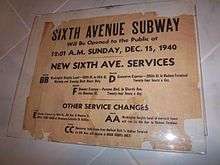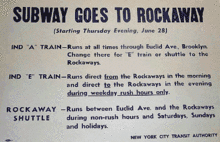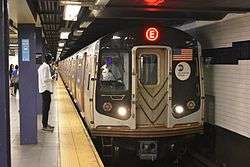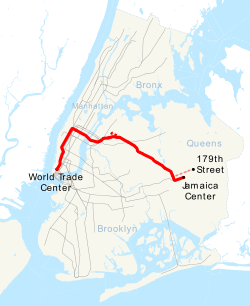E (New York City Subway service)
The E Eighth Avenue Local[2] is a rapid transit service in the B Division of the New York City Subway. Its route emblem, or "bullet", is blue since it uses the IND Eighth Avenue Line in Manhattan.[3]
The E operates at all times between Jamaica Center–Parsons/Archer in Jamaica, Queens, and Chambers Street–World Trade Center in Lower Manhattan; limited rush hour service originates and terminates at 179th Street[lower-alpha 1] instead of Jamaica Center. Daytime service operates express in Queens[lower-alpha 2] and local in Manhattan; late night service makes local stops along its entire route.
In its early years, the E train ran along the Rutgers Street Tunnel and IND Culver Line to Brooklyn, though this service pattern stopped by the 1940s. Until 1976, it ran to Brooklyn and Queens via the IND Fulton Street Line and IND Rockaway Line.
History
On August 19, 1933, E service officially began, running between Roosevelt Avenue–Jackson Heights and the Hudson Terminal (current World Trade Center station). The E would not yet run express via Queens Boulevard as the IND Crosstown Line did not yet fully open until Brooklyn, and the Queens Boulevard Line had not yet opened to Jamaica.[4][5][6]
On January 1, 1936, the IND Sixth Avenue Line opened to East Broadway and the E was extended there. E trains no longer served stations on the Eighth Avenue Line south of West Fourth Street.[4][7] On April 9 of the same year, the Sixth Avenue Line was extended through the Rutgers Street Tunnel to Jay Street–Borough Hall, and E trains were extended via this line and the IND Culver Line to Church Avenue, replacing the A train.[4][8] E service was again extended when the Queens Boulevard Line was extended to Kew Gardens–Union Turnpike on December 31, 1936,[9][10] and then to 169th Street on April 24, 1937.[11][12] E trains began running express between Continental Avenue and Queens Plaza on April 24, 1937.[4][13]
On September 12, 1938, several weekday rush hour trains began terminating at Jay Street in the morning, and a few entered service at Smith–Ninth Streets in the evening.[4] Between 1939 and 1940, select PM E trains ran to-and-from the Horace Harding Boulevard terminal at the 1939 New York World's Fair, terminating at Hudson Terminal in Manhattan. Service ended following the fair.[14][15]


On December 15, 1940, service on the entire Sixth Avenue Line began. The E was cut back to Broadway–Lafayette Street. South of that station, it was replaced by the F train.[16] On October 24, 1949, the E was extended during rush hours to Broadway – East New York running via Fulton Street Local.[17]
On December 10, 1950, 179th Street opened. E service terminated there, running express between Queens Plaza and 71st Avenue and local from 71st Avenue to 179th Street.[4][18][19][20]
In 1953, the platforms were lengthened to 660 feet at 75th Avenue, Sutphin Boulevard, Spring Street, Canal Street, Ralph Avenue and Broadway–East New York so that E trains could run eleven car trains. The E began running eleven car trains during rush hours on September 8, 1953. The extra train car increased the total carrying capacity by 4,000 passengers.[21]
Then, on October 30, 1954, E trains began running to Hudson Terminal during non-rush hours, and began running express in Manhattan during rush hours.[22]
On June 28, 1956, the LIRR Rockaway Beach Branch re-opened as the IND Rockaway Line after being converted for subway service[23] and E service was extended from East New York to Rockaway Park or Wavecrest during weekday rush hours. During non-rush hours, service was provided by shuttle service between Euclid and Rockaway Park or Wavecrest.[4]
On September 16, 1956, rush hour E service was cut back to Euclid Avenue when Rockaway service was replaced by the A train. The A and E later switched southern terminals again, and on September 6, 1958, the E began running to the Rockaways during rush hours. During off-peak hours on weekedays, separate shuttles operated to Far Rockaway and Rockaway Park. During weekends and late nights round-robin service operated.[24]:216 On September 8, 1959, the E began running express to Euclid Avenue, while the A became local;[4] however, in 1960, the E train became an express in Brooklyn and was extended to the Rockaways, with some put-ins beginning at Euclid Avenue and later Lefferts Boulevard during rush hours.[4] Some E trains were extended to Lefferts Boulevard on June 6 of that year due to complaints.[4][25] In 1963–1964, the E was extended to the Rockaways during rush hours, with some put-ins beginning at Euclid Avenue and later Lefferts Boulevard.[4]
.svg.png)
1967–1979 bullet
|
On March 23, 1970, southbound E trains, during rush hours, began stopping at the lower level of the 42nd Street station.
On January 2, 1973, the E train became the local in Brooklyn again, running to Rockaway Park–Beach 116th Street only.[4][26][27] Finally, on August 27, 1976, E service in Brooklyn was eliminated with all trains terminating at World Trade Center (the local platform). Brooklyn service was replaced by the CC local.[4][28][29]
On December 11, 1988, the IND Archer Avenue Line opened. E trains were rerouted via this branch, stopping at the upper level of the Sutphin Boulevard and Jamaica Center stations. The E train now skipped 75th Avenue and Van Wyck Boulevard on weekdays. R service was extended to 179th Street, replacing the E as the Hillside Avenue Local service, but this was later discontinued when the F became the local. A few rush hour trains continue to operate to 179th Street.[4][30][31][32] On March 23, 1997, the E service began stopping at 75th Avenue and Van Wyck Boulevard during evenings, nights and weekends.
On August 30, 1997, E service began running local in Queens during late nights.[4][33]
During the early part of 2000, because of the replacement of track switches at the World Trade Center station, the E was extended to Euclid Avenue at all times except late nights, when it operated to Canal Street.[4] Service on the E was again affected by the September 11 attacks in 2001, as its terminal station, World Trade Center, was located at the northeastern corner of the World Trade Center site, so for a time, the E again operated to Euclid Avenue in Brooklyn as the local on the IND Fulton Street Line at all times except late nights, replacing the temporarily suspended C service. On September 24, 2001, C service was restored, and E service was cut back to Canal Street, since World Trade Center would be closed until January 2002.
On December 16, 2001, the connection from the IND 63rd Street Line to the Queens Boulevard Line opened, and F trains were rerouted via this connector to travel between Manhattan and Queens. Some rush hour E trains now ran to 179th Street, allowing passengers on Hillside Avenue east of Union Turnpike to have an express service to 53rd Street. This was also due to the lack of capacity at Jamaica Center during rush hours.
EE service
.svg.png)
EE bullet
|
The EE originally ran as an Eighth Avenue local between 71st–Continental Avenues and Chambers Street during off peak hours when the GG didn't run.[13][34] This service was discontinued when the IND Sixth Avenue Line was completed in 1940. However, the EE reappeared in 1967 when it ran between 71st–Continental Avenues and Whitehall Street via the local tracks of the BMT Broadway Line, replacing the QT and RR.[28][35] This service was discontinued on August 30, 1976, and replaced by the N.[29][36] The route of the EE to Whitehall Street is currently duplicated by the R service.
Route
Service pattern
The following table shows the lines used by the E service, with shaded boxes indicating the route at the specified times:[37]
| Line | From | To | Tracks | Times | |||
|---|---|---|---|---|---|---|---|
| rush hours | weekdays | evenings, weekends | late nights | ||||
| IND Archer Avenue Line (full line) | Jamaica Center–Parsons/Archer | Jamaica–Van Wyck | all | Most trains | |||
| IND Queens Boulevard Line (full line) | Jamaica–179th Street | Sutphin Boulevard | express | Limited service | N/A | N/A | N/A |
| Briarwood | 75th Avenue | ||||||
| local | |||||||
| Forest Hills–71st Avenue | Queens Plaza | express | |||||
| local | |||||||
| Court Square–23rd Street | Seventh Avenue | all | |||||
| IND Eighth Avenue Line | 50th Street | World Trade Center | local | ||||
Four E trips originate from 179th Street during the a.m. rush hour,[38] three E trips originate from 179th Street during the p.m. rush hour, and four trips terminate at 179th Street during the p.m. rush hour.[39]
Stations
For a more detailed station listing, see the articles on the lines listed above.
| Station service legend | |
|---|---|
| Stops all times | |
| Stops all times except late nights | |
| Stops late nights only | |
| Stops weekdays only | |
| Stops rush hours in the peak direction only | |
| Station closed | |
| Stops rush hours only (limited service not noted on map) | |
| Stops evenings, late nights, and weekends | |
| Time period details | |
| Station is compliant with the Americans with Disabilities Act | |
| Station is compliant with the Americans with Disabilities Act in the indicated direction only | |
| Elevator access to mezzanine only | |
JC |
179 |
Stations | Subway transfers | Connections/Other Notes | |
|---|---|---|---|---|---|
| Queens | |||||
| Hillside Avenue Branch (limited rush hour service only) | |||||
| N/A | Jamaica–179th Street | F |
Q3 bus to JFK Int'l Airport | ||
| Parsons Boulevard | F |
||||
| Archer Avenue Branch | |||||
| N/A | Jamaica Center–Parsons/Archer | J |
Q44 Select Bus Service | ||
| Sutphin Boulevard–Archer Avenue–JFK Airport |
J |
LIRR City Terminal Zone at Jamaica AirTrain JFK Q44 Select Bus Service | |||
| Jamaica–Van Wyck | |||||
| Queens Boulevard Line (services from 179th Street and Jamaica Center merge) | |||||
| | | Briarwood | F |
Q44 Select Bus Service | ||
| Kew Gardens–Union Turnpike | F |
Q10 bus to JFK Int'l Airport Some northbound a.m. rush hour trips terminate at this station | |||
| | | 75th Avenue | F |
|||
| Forest Hills–71st Avenue | F |
LIRR City Terminal Zone at Forest Hills | |||
| | | 67th Avenue | ||||
| | | 63rd Drive–Rego Park | Q72 bus to LaGuardia Airport | |||
| | | Woodhaven Boulevard | Q53 Select Bus Service | |||
| | | Grand Avenue–Newtown | Q53 Select Bus Service | |||
| | | Elmhurst Avenue | Q53 Select Bus Service | |||
| Jackson Heights–Roosevelt Avenue | 7 F |
Q47 bus to LaGuardia Airport Marine Air Terminal Q53 Select Bus Service Q70 Select Bus Service to LaGuardia Airport | |||
| | | 65th Street | ||||
| | | Northern Boulevard | ||||
| | | 46th Street | ||||
| | | Steinway Street | ||||
| | | 36th Street | ||||
| Queens Plaza | M |
||||
| Court Square–23rd Street | M G 7 |
||||
| Manhattan | |||||
| Lexington Avenue–53rd Street | 4 M |
||||
| Fifth Avenue/53rd Street | M |
||||
| Seventh Avenue | B |
||||
| Eighth Avenue Line | |||||
| 50th Street | A |
Station is ADA-accessible in the southbound direction only | |||
| 42nd Street–Port Authority Bus Terminal | A 1 7 N S at Times Square–42nd Street |
Port Authority Bus Terminal M34A Select Bus Service | |||
| 34th Street–Penn Station | A |
M34/M34A Select Bus Service Amtrak, LIRR, NJ Transit at Pennsylvania Station | |||
| 23rd Street | A |
M23 Select Bus Service | |||
| 14th Street | A L |
||||
| West Fourth Street–Washington Square | A B |
PATH at 9th Street | |||
| Spring Street | A |
||||
| Canal Street | A |
||||
| World Trade Center [lower-alpha 3] | A 2 N |
PATH at World Trade Center Hoboken and Jersey City ferries | |||
Notes
- ↑ Limited rush hour service to Manhattan originates at 179th Street during a.m. and p.m. rush hours; service from Manhattan terminates at 179th Street during p.m. rush hours only. Signs are located above the express tracks at Parsons Boulevard, showing that trains skip 169th Street. Part of one of these signs can be seen in this 2004 photo Archived September 27, 2007, at the Wayback Machine..
- ↑ During weekday rush hours and middays, E trains skip 75th Avenue and Briarwood; at all other times, E trains serve these two stops.
- ↑ Chambers Street–World Trade Center are actually counted as two separate stations by the MTA. The E train terminates at World Trade Center while the A and C trains have through service at Chambers Street.
References
- ↑ Korman, Joe (January 12, 2018). "BMT-IND Car Assignments". JoeKorNer.
- ↑ "E Subway Timetable, Effective June 24, 2018" (PDF). Metropolitan Transportation Authority. Retrieved June 24, 2018.
- ↑ http://web.mta.info/developers/resources/line_colors.htm
- 1 2 3 4 5 6 7 8 9 10 11 12 13 14 15 16 "NYCT Line by Line History". www.erictb.info. Retrieved June 17, 2016.
- ↑ "New Subway Links Running Smoothly; Exact Schedules Maintained on First Day's Operation of Queens Tubes". The New York Times. August 20, 1933. ISSN 0362-4331. Retrieved June 20, 2016.
- ↑ "Two Subway Units Open at Midnight; Links in City-Owned System in Queens and Brooklyn to Have 15 Stations. Trains Tested on Routes Full Staffs Operate Them on Schedule Minus Passengers -- Celebrations Planned". The New York Times. August 18, 1933. ISSN 0362-4331. Retrieved June 20, 2016.
- ↑ "La Guardia Opens New Subway Link; Warmly Praises Delaney as He Puts $17,300,000 Line on East Side Into Service. Seeks Wider Home Rule Hints at Ceremony That City Will Again Attempt to End Transit Board's Powers. The Mayor Opens a New Line of the City Subway System. La Guardia Opens New Subway Link". The New York Times. January 2, 1936. ISSN 0362-4331. Retrieved June 20, 2016.
- ↑ "Two Subway Links Start Wednesday; City Will Begin Operating Fulton Street Line and Extension to Jay Street. Mayor to Make Trip Entire System With Exception of Sixth Av. Route to Be Finished Early Next Year". The New York Times. April 6, 1936. ISSN 0362-4331. Retrieved June 20, 2016.
- ↑ Scramble is Mild at subway opening Few Turn out at 7 AM in Kew Gardens to be first new station
- ↑ Scramble is Mild at subway opening Few Turn out at 7 AM in Kew Gardens to be first new station
- ↑ "Subway Link Opens Soon: City Line to Jamaica Will Start About April 24" (PDF). The New York Times. March 17, 1937. Retrieved June 27, 2015.
- ↑ "Trial Run to Jamaica on Subway Tomorrow: Section From Kew Gardens to 169th Street Will Open to Public in Two Weeks" (PDF). The New York Times. April 9, 1937. Retrieved June 30, 2015.
- 1 2 "New Subway Link to Jamaica Opened; La Guardia, City Officials and Civic Groups Make Trial Run on 10-Car Train". The New York Times. April 25, 1937. ISSN 0362-4331. Retrieved June 20, 2016.
- ↑ "How to Get To The Fair Grounds; by Subway". The New York Times. April 30, 1939. Retrieved July 7, 2015.
- ↑ "New Subway Spur Is Ready to Open: First Train to Start Four Minutes Before the Fair Officially Begins". The New York Times. April 17, 1939. Retrieved July 7, 2015.
- ↑ "The New Subway Routes". The New York Times. December 15, 1940. ISSN 0362-4331. Retrieved June 20, 2016.
- ↑ "IND Faster Service Will Start Sunday" (PDF). The New York Times. October 20, 1949. Retrieved February 20, 2016.
- ↑ "PWA Party Views New Subway Link: Queens Section to Be Opened Tomorrow Is Inspected by Tuttle and Others" (PDF). The New York Times. December 30, 1936. Retrieved June 27, 2015.
- ↑ "New Subway Link Opening in Queens" (PDF). The New York Times. December 12, 1950. Retrieved June 30, 2015.
- ↑ "Subway Link Opens Monday" (PDF). The New York Times. December 6, 1950. Retrieved June 30, 2015.
- ↑ Ingalls, Leonard (August 28, 1953). "2 Subway Lines to Add Cars, Another to Speed Up Service" (PDF). The New York Times. Retrieved January 25, 2016.
- ↑ "Bronx to Coney Ride In New Subway Link" (PDF). The New York Times. October 18, 1954. Retrieved February 20, 2016.
- ↑ Freeman, Ira Henry (June 28, 1956). "Rockaway Trains to Operate Today" (PDF). The New York Times. Retrieved June 29, 2015.
- ↑ ERA Headlights. Electric Railroaders Association. 1956.
- ↑ "Some "E" Trains Were Extended To Lefferts Boulevard". The New York Division Bulletin. Electric Railroaders' Association. 3 (2): 1. June 1960 – via Issu.
- ↑ "Subway Schedules In Queens Changing Amid Some Protest". The New York Times. January 2, 1973. p. 46. Retrieved March 20, 2010.
- ↑ "Changes Set for Jan. 2 Praised" (PDF). The New York Times. November 25, 1972. Retrieved January 25, 2016.
- 1 2 Fischler, Stan; Friedman, Richard (May 23, 1976). "Subways" (PDF). The New York Times. Retrieved July 7, 2015.
- 1 2 "Service Adjustment on BMT and IND Lines Effective 1 A.M. Monday, Aug. 30". Flickr. New York City Transit Authority. August 1976. Retrieved October 23, 2016.
- ↑ "System-Wide Changes In Subway Service Effective Sunday, December 11, 1988". Flickr - Photo Sharing!. Retrieved June 17, 2016.
- ↑ Alternatives Analysis/Supplemental Draft Environmental Impact Statement for the Queens Subway Options Study. United States Department of Transportation, Metropolitan Transportation Authority, Urban Mass Transit Administration. May 1990. Retrieved August 13, 2016.
- ↑ Johnson, Kirk (December 9, 1988). "Big Changes For Subways Are to Begin". The New York Times. Retrieved July 14, 2015.
- ↑ "Starting August 30, there will be changes in late-night service along Queens Boulevard". New York Daily News. September 2, 1997. Retrieved September 30, 2018.
- ↑ Danzig, Allison (September 7, 1939). "International Array of Stars Ready for Opening of U.S. Title Tennis Today; Four Australians Stay for Tourney Quist, Bromwich, Hopman and Crawford Get Permission to Play at Forest Hills Riggs Among Favorites Hopes to Avenge Setback in Davis Cup Event--British Women to Seek Honors". The New York Times. Retrieved July 7, 2015.
- ↑ Perlmutter, Emanuel (November 16, 1967). "Subway Changes To Speed Service: Major Alterations in Maps, Routes and Signs Will Take Effect Nov. 26" (PDF). The New York Times. Retrieved July 7, 2015.
- ↑ Burks, Edward C. (August 14, 1976). "215 More Daily Subway Runs Will Be Eliminated by Aug. 30". The New York Times. Retrieved July 7, 2015.
- ↑ "Subway Service Guide" (PDF). Metropolitan Transportation Authority. June 25, 2017. Retrieved July 1, 2017.
- ↑ "E train southbound". Trip Planner+. Retrieved October 30, 2016.
- ↑ "E train northbound". Trip Planner+. Retrieved October 30, 2016.
External links
| Wikimedia Commons has media related to E (New York City Subway service). |



